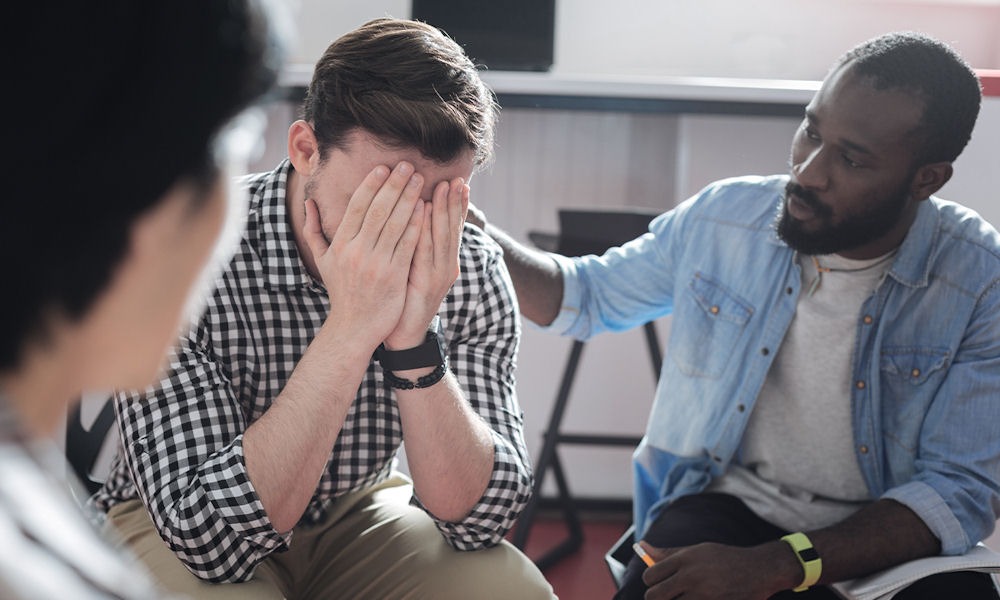In today’s rapidly changing world, the prevalence of anxiety has unfortunately surged, impacting millions of individuals across the globe. This pervasive mental health concern knows no bounds, affecting both men and women indiscriminately. However, it’s important to recognize that anxiety can manifest differently in men, presenting unique challenges.
By understanding these nuances, we can promote greater empathy and support for men dealing with anxiety. It’s important to work to dismantle stigmas. This way, we can provide invaluable support, and foster environments where individuals of all genders feel empowered to seek help and thrive despite their struggles with anxiety.
What Does Anxiety Look Like in Men?
Anxiety can manifest differently in men compared to women, often due to social and cultural norms that may influence how men express and cope with their emotions.
At its core, anxiety is a natural response to stress or perceived threats. When someone is anxious, their body ramps up into a heightened state of alertness, getting ready to confront what it sees as danger. Feeling anxious sometimes is normal, especially when facing tough or unfamiliar situations.
But if anxiety becomes excessive or sticks around for a long time, getting in the way of daily life, it might point to an anxiety disorder. These disorders can vary in seriousness and might need professional help to manage them effectively.
Here are some common ways anxiety may appear in men:
Men may experience physical manifestations of anxiety, such as muscle tension, headaches, digestive issues, and fatigue. They may focus on these physical symptoms without (or rather than) acknowledging the underlying anxiety.
Instead of showing overt signs of worry or nervousness, men might express their anxiety through irritability, anger outbursts, or aggression. This can be a way of masking vulnerability or discomfort.
Men may cope with anxiety by avoiding situations or activities that trigger their anxious feelings. This could include avoiding social gatherings, work tasks, or responsibilities that provoke stress.
Some men turn to alcohol, drugs, or other substances as a way to self-medicate and alleviate feelings of anxiety. However, this often leads to a cycle of dependency and can exacerbate anxiety in the long run.
Men might immerse themselves excessively in work, hobbies, or other activities as a distraction from their anxious thoughts and feelings. While this may provide temporary relief, it can also lead to burnout and further stress.
Societal expectations of masculinity often discourage men from openly discussing their emotions or seeking help for mental health issues. As a result, men may struggle to articulate their feelings of anxiety or downplay their significance.
Men may neglect their physical health when experiencing anxiety, such as skipping regular medical check-ups or ignoring symptoms of illness. This can further contribute to their overall stress levels.
Some men may set unrealistic standards for themselves in various aspects of their lives, leading to constant worry about failure or not meeting expectations. This perfectionistic mindset can fuel anxiety and self-doubt.
What Causes Anxiety for Men?
 Anxiety in men can be triggered by a variety of factors, including:
Anxiety in men can be triggered by a variety of factors, including:
- Stressful life events: Major life changes such as starting a new job, moving to a new place, or experiencing relationship problems can lead to anxiety.
- Work pressure: The pressure to perform well at work, meet deadlines, or handle responsibilities can cause significant stress and anxiety for men.
- Financial concerns: Worries about money, debt, job security, or providing for a family can contribute to anxiety.
- Relationship Issues: Difficulties in relationships, whether romantic, familial, or social, can lead to anxiety, especially if communication problems or conflicts arise.
- Health concerns: Men may experience anxiety related to their physical health, such as worrying about illnesses, injuries, or chronic conditions.
- Social expectations: Societal expectations of masculinity and the pressure to appear strong, competent, and in control can lead men to internalize their emotions. This contributes to anxiety.
- Trauma or abuse: Past traumatic experiences or instances of abuse can lead to anxiety in men, especially if left unresolved or unaddressed.
- Substance abuse: Misuse of alcohol, drugs, or other substances can exacerbate anxiety symptoms or serve as a coping mechanism for underlying anxiety.
- Genetic predisposition: Some men may have a genetic predisposition to anxiety disorders, meaning they are more likely to develop anxiety due to their family history.
- Personality traits: Certain personality traits, such as perfectionism, pessimism, or a tendency to worry excessively, can increase the likelihood of experiencing anxiety.
It’s important to recognize that anxiety symptoms in men can stem from a combination of these factors. Seeking support from mental health professionals can be beneficial in managing anxiety symptoms effectively.
What are the Types of Anxiety Disorders?
Anxiety disorders are the most common mental health diagnoses in the United States, affecting roughly 40 million adults annually. Different subtypes exist, each describing a different experience:
GAD involves excessive and persistent worry about various aspects of life (such as work, health, or family) even when there is little or no reason for concern. Physical symptoms like restlessness, muscle tension, and difficulty concentrating often accompany the worry.
Panic disorder manifests through abrupt, recurring panic attacks marked by intense episodes of fear or discomfort. These attacks can cause physical symptoms such as a rapid heart rate, sweating, trembling, and feelings of choking or suffocation. Individuals with panic disorder often fear future attacks and avoid places where they’ve happened, intensifying anxiety about potential episodes.
Social anxiety disorder involves intense fear or anxiety about social situations where one might be scrutinized or judged by others. This fear can lead to avoidance of social interactions or situations, such as speaking in public, meeting new people, or attending social gatherings.
An intense and irrational fear of a particular object, situation, or activity characterizes specific phobias. Common phobias include fear of heights, spiders, flying, or enclosed spaces. Individuals with specific phobias may go to great lengths to avoid the object of their fear, leading to significant disruption in daily life.
OCD involves recurrent and intrusive thoughts, images, or impulses (obsessions) that cause anxiety. It also includes repetitive behaviors or mental acts (compulsions) performed in response to the obsessions. These compulsions are aimed at reducing distress or preventing a feared event, but often result in temporary relief followed by increased anxiety.
PTSD can develop after experiencing or witnessing a traumatic event, such as combat, a natural disaster, a serious accident, or a physical or sexual assault. Symptoms include intrusive memories, flashbacks, nightmares, avoidance of reminders of the trauma, negative changes in mood and cognition, and heightened arousal.
Separation anxiety disorder is characterized by excessive fear or anxiety about separation from attachment figures or the home. It is most commonly diagnosed in children, but can also occur in adults.
How are Men’s Anxiety Symptoms Treated?

Men’s anxiety symptoms can be treated through various approaches that are tailored to individual needs and the severity of the symptoms. Here are some common treatments:
Cognitive-behavioral therapy (CBT) is often recommended for anxiety treatment. It helps individuals recognize and change negative thought patterns and behaviors that contribute to anxiety. Other therapy approaches, like mindfulness-based therapy or experiential therapy, can also be effective.
Antidepressants such as selective serotonin reuptake inhibitors (SSRIs) or serotonin-norepinephrine reuptake inhibitors (SNRIs) are commonly prescribed to alleviate anxiety symptoms. Benzodiazepines may be used for short-term relief, but are generally avoided for long-term use due to the risk of dependence.
Engaging in regular exercise, maintaining a balanced diet, and getting adequate sleep can help manage anxiety symptoms. Reducing caffeine and alcohol consumption can also have positive effects.
Learning relaxation techniques such as deep breathing, progressive muscle relaxation, or meditation can help reduce anxiety levels.
Participating in support groups or group therapy sessions with others experiencing similar challenges can provide valuable emotional support and coping strategies.
Self-care activities such as hobbies, spending time with loved ones, or engaging in enjoyable activities can promote overall well-being and reduce anxiety.
It’s important to seek help from qualified professionals that can provide constructive support. Men’s addiction treatment centers recognize the importance of addressing addiction within the context of masculinity and gender-specific issues, providing a safe and supportive space for men to address their substance abuse and work towards lasting recovery.
How Can You Support a Man Struggling with Anxiety?
Supporting someone with anxiety involves a multifaceted approach, including providing emotional support, encouraging professional help, and promoting self-care activities. By listening attentively, offering reassurance, and educating oneself about anxiety, one can create a supportive environment that fosters healing.
Additionally, respecting boundaries, staying calm, and celebrating progress are crucial aspects of supporting a loved one through their anxiety journey. By offering understanding, patience, and practical assistance, you can play a crucial role in helping them manage anxiety and improve their overall well-being.
It’s important to remember that supporting someone with anxiety can be challenging and requires ongoing effort. Your presence and support are crucial for their ability to cope and thrive despite their struggles with anxiety.
Find Help for Men’s Anxiety at Acqua Recovery
Take the first step towards reclaiming your life from anxiety. At Acqua Recovery, we understand the unique challenges men face when dealing with anxiety symptoms. Our compassionate team is here to provide personalized treatment and support tailored to your needs. Take charge of your life and break free from anxiety’s grip. Contact us today to begin your path to healing and peace











